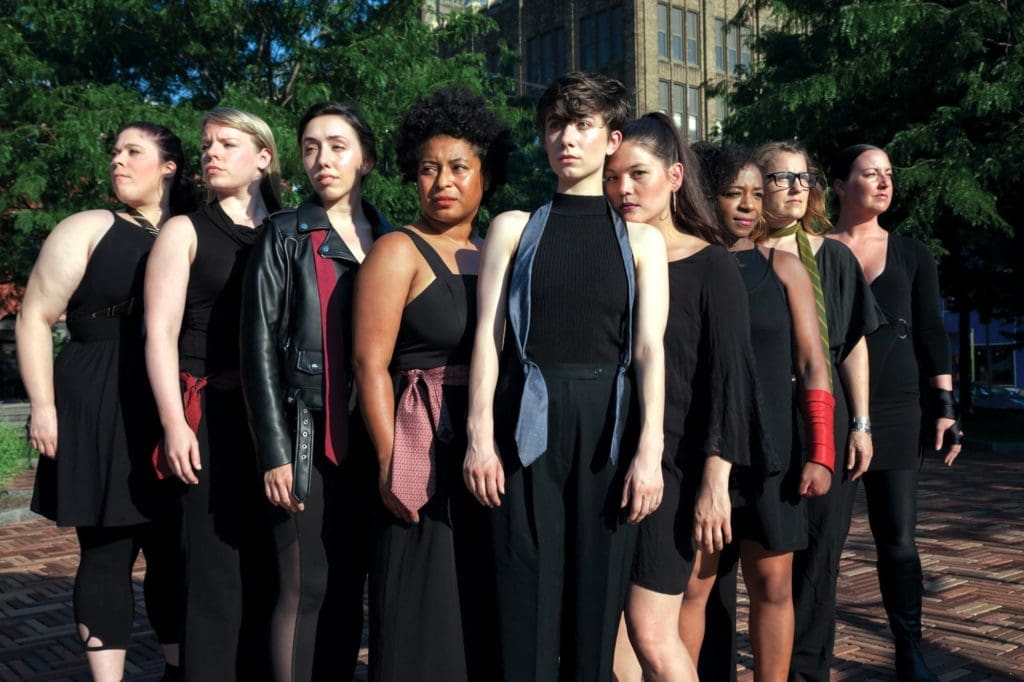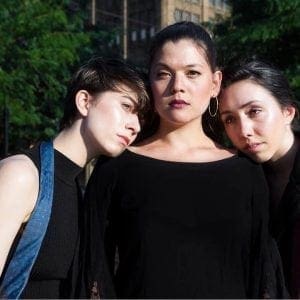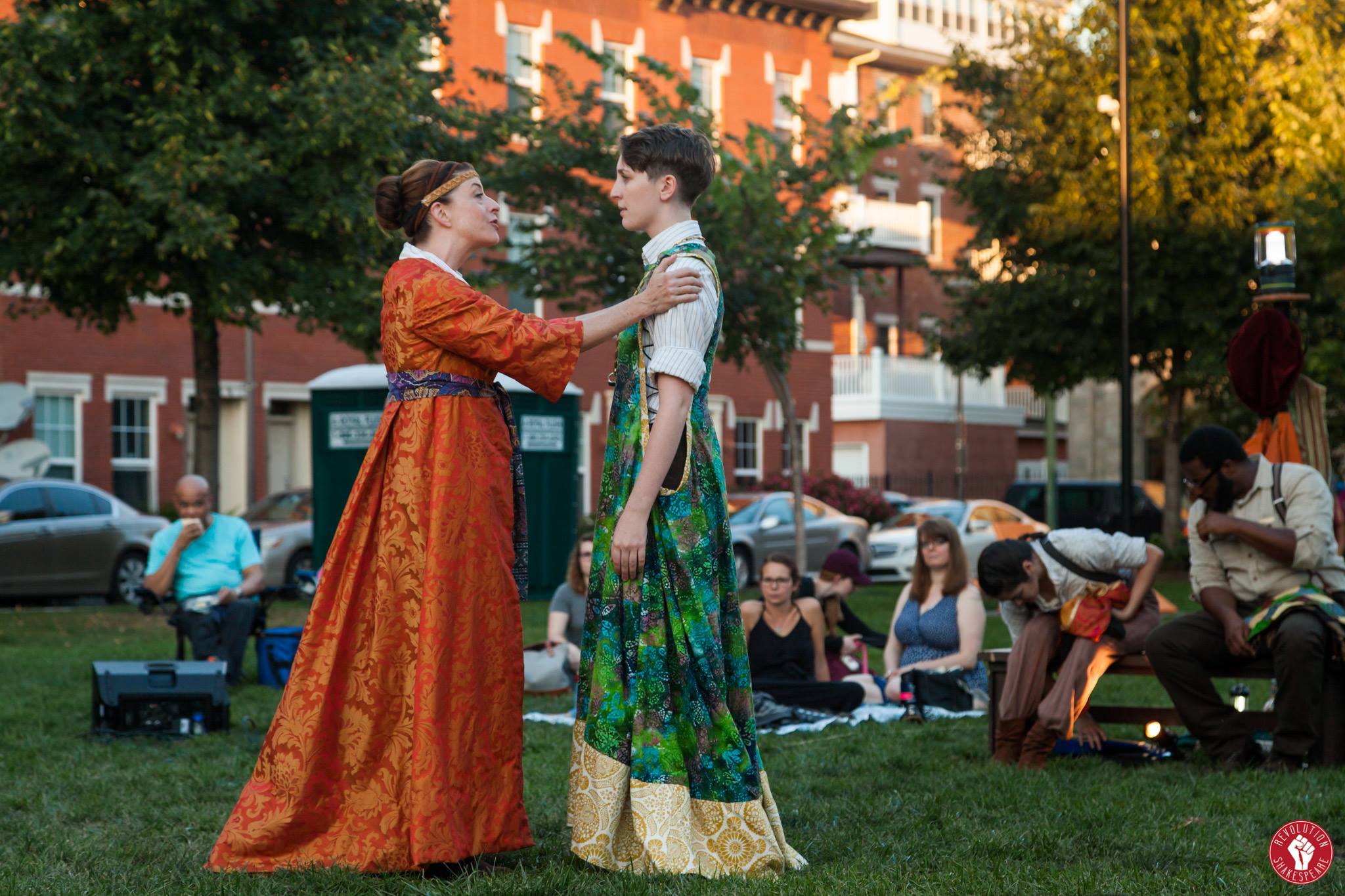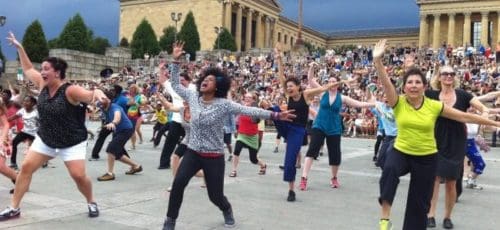Meg and Dana Are Troilus and Cressida in RevShakes Non-traditional Fringe Casting
Revolution Shakespeare’s outdoor performances in Bella Vista’s Hawthorne Park have become staple of FREE Fringe offerings. For their fifth Festival production, the company continues its tradition of producing fiercely modern takes on lesser-known Shakespeare works with Troilus and Cressida.
Directed by star Philadelphia director Brenna Geffers, the staging of the Bard’s intriguing piece on star-crossed lovers in the Trojan War sees a gender-defying non-traditional casting, headlined by Meg Rumsey-Lasersohn and Dana Kreitz as the titular characters. FringeArts spoke to the pair about the play, their roles, and the importance of RevShakes’ unconventional casting.
FringeArts: What appealed to you about Troilus and Cressida?
Meg Rumsey-Lasersohn: I think I first read Troilus and Cressida in college, with a professor who LOVED it. And I remember being totally baffled the first time through—like, what IS this? It’s almost historical fanfiction. I was obsessed with Greek mythology and the Trojan war as a kid, so that has appealed to me for a long time, but honestly, nothing appealed to me about Troilus. I thought he was an absolute jerk. That’s part of why I am excited to play the role—to find what I love in him, what I empathize with.
Dana Kreitz: The play was appealing to me in the way that it dealt with these iconic, fabled characters and Cressida was, and is, so wonderful for me to explore because she’s a woman doing her best with the cards she’s dealt. And she continuously gets some pretty shitty cards. And through it all, she keeps her wit. And she keeps her strength. And Shakespeare treats her with some kindness and mercy, I think, in his portrayal of her struggles and choices, and doesn’t simply write her off as the faithless lover that she’s known as being. She gets to be human.
FringeArts: Why is it a good play for 2018?
Dana Kreitz: Oh it is a play that is so much about masculinity! And the toxicity that is bred from these men flaunting their power and their prowess. It feels a little familiar…
Meg Rumsey-Lasersohn: I think there’s the obvious discussion around women’s agency and the threat of being objectified and sexualized in world full of powerful men. But I also think there is an important conversation in the play about people being more interested in winning, and in the public image of winning, than they are in people’s’ lives. The war the characters are fighting could probably be resolved really easily if they were willing to ask the women they’re fighting over what they wanted, but the leaders are too invested in maintaining their identities as warriors, as victors, to actually address the problem and prevent more people from dying.
FringeArts: Meg, what challenges do you see in playing a traditionally “male” role? What do you like about it?
Meg Rumsey-Lasersohn: I don’t know that it is any more challenging than playing any role in Shakespeare. My lived experience is just as far away from being a Trojan warrior or royalty than it is from being a young man, so I think the interesting difficulties are those all actors face no matter the role. If anything, with Shakespeare, I think it is easier to play a traditionally male role—those roles tend to have WAY more text to explore and more space to communicate character within the text.
FringeArts: Why do you welcome Revolution Shakespeare’s commitment to non-traditional casting?
Meg Rumsey-Lasersohn: Because otherwise it might have taken me ten years to work with all of the people in this cast. It is so rare to work with this many non-male people at once. We deserve meaty roles! We deserve to depict the full range of human experience, because we are a part of that.
Dana Kreitz: I think it’s imperative, and I hope the day will come when ”non-traditional” is the norm. Women and minorities are still severely underrepresented on popular stages. And if we continue doing classical work, like Shakespeare, it was written in a different time for a different audience. We don’t need to continue watching majority cis white male casts. Bring the play to the contemporary audience, and let other people see themselves reflected on stage! Representation is important!
Also, for this project in particular, being in a rehearsal room with a bunch of women is so bad-ass! It really doesn’t happen in other creative processes. And exploring the themes of this play through primarily female perspectives is so fulfilling.
FringeArts: One of our favorite things about Revolution Shakespeare shows is the food trucks at performances. What’s your favorite food truck food?
Dana Kreitz: Probably falafel from a halal guys truck with all the white and red sauce. But I gotta say, I also love some cheese curds and tacos and breakfast sammies and dosas and man, I just love a food truck.
Meg Rumsey-Lasersohn: Pierogies from Mom-Mom’s Polish Food Cart.
FringeArts: What else are you looking to this Fringe?
Dana Kreitz: Shameless plug! I’m choreographing Close Your Legs Honey, produced by PHIT and created by Shamus McCarty and Hannah Parke, and I’m stoked to have a hand in this piece. Otherwise, I’ll poke around the Fringe Guide and just make lists of things that fit my schedule! It’s one of my favorite parts of the Fringe: I never know quite what I’m going to get.
Meg Rumsey-Lasersohn: A New Kind of Whole, by Paige Zubel, directed by Claris Park. They are a dynamic duo, and the only reason I didn’t beg to do that show was because of this one! White Feminist, by Lee Minora. She’s one of the best performers in Philadelphia, in my opinion. Also, Chris Davis. Literally just anything Chris does.
—Christopher Munden
What: Troilus and Cressida
When: September 12–22, 2018
Where: Hawthorne Park, 1200 Catharine Street (South Philly)
Cost: FREE
Directed by Brenna Geffers
FringeArts.com/event/troilus-and-cressida






